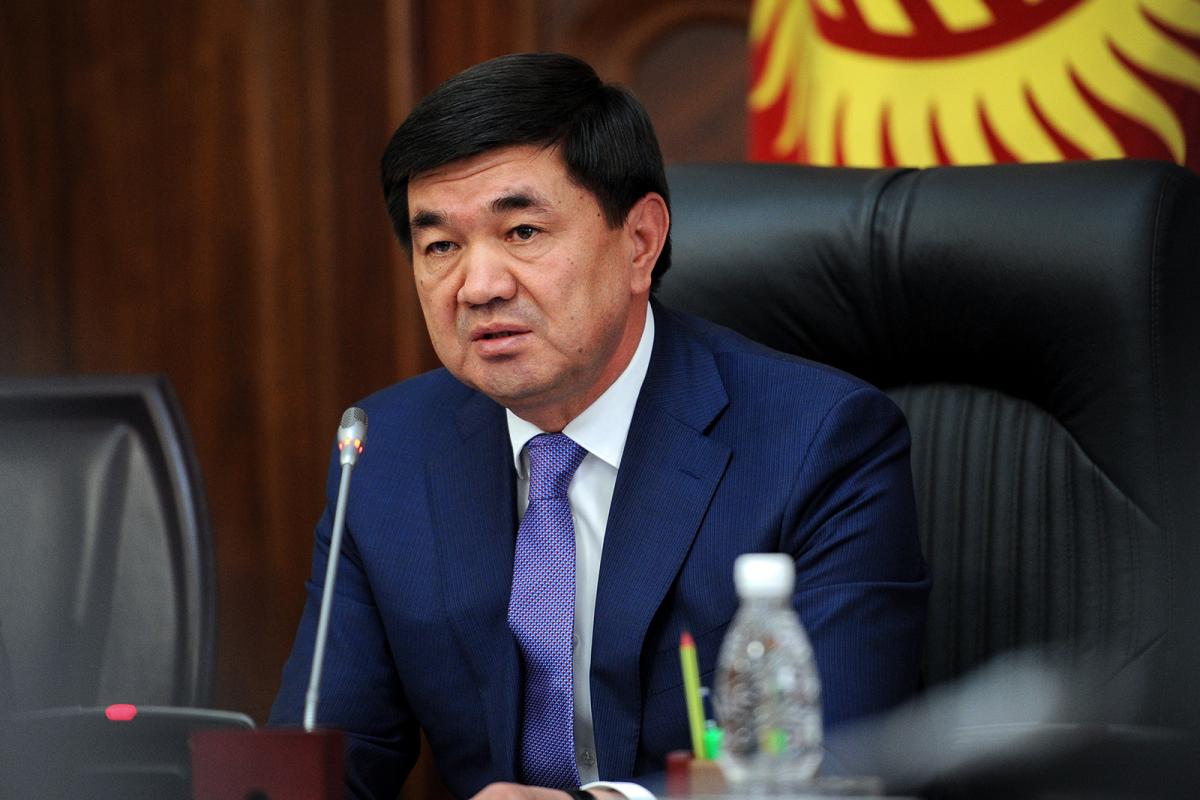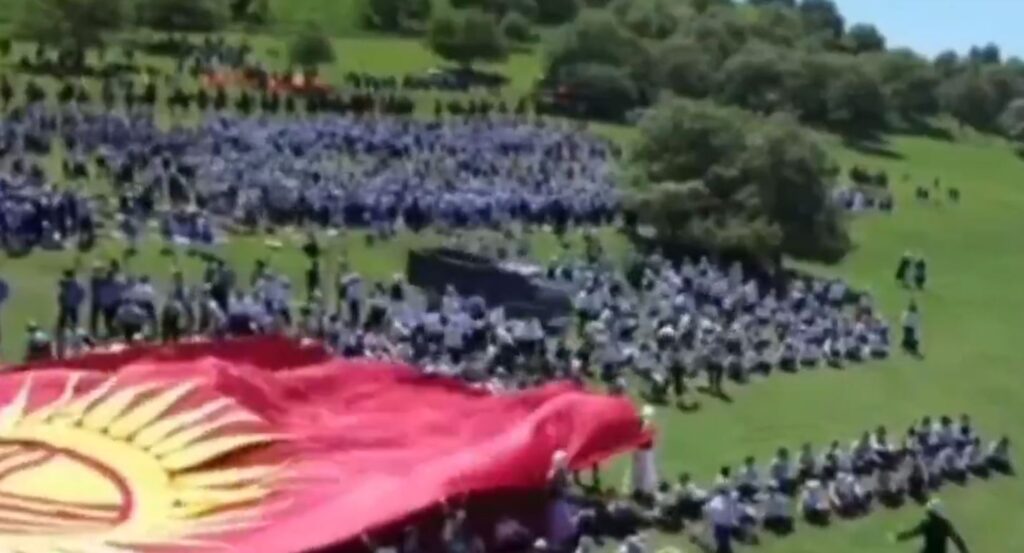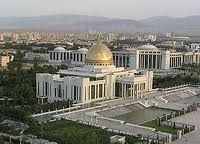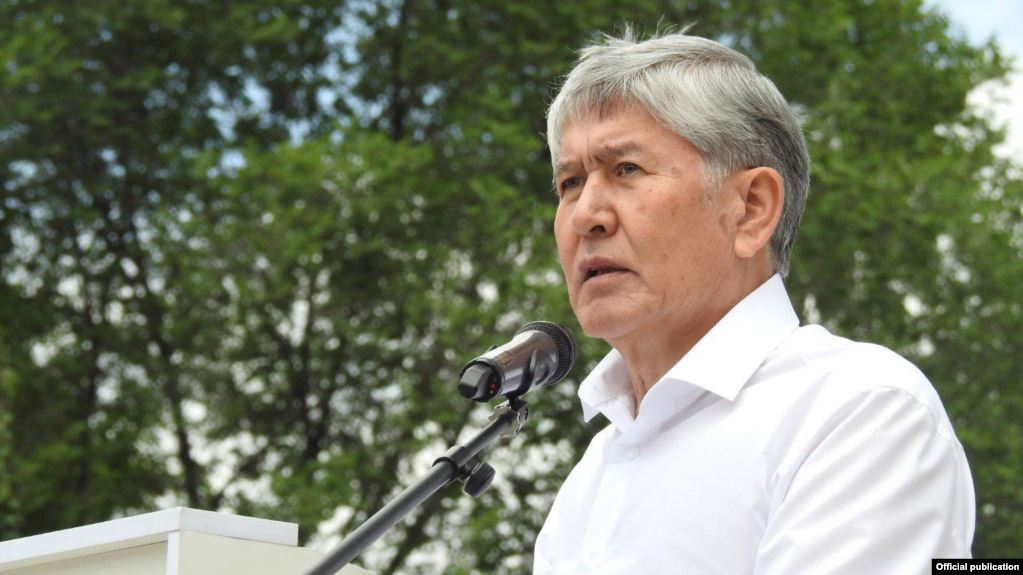BISHKEK (TCA) — The new, 30th cabinet has been sworn in in Kyrgyzstan, which includes old faces and pursues the old goals left over from the previous governments. We are republishing this article on the issue by Nurjamal Djanibekova, originally published by Eurasianet:
There is at least one new thing about Kyrgyzstan’s latest prime minister.
In a faintly populist move, Mukhammedkaliy Abylgaziyev, 50, has announced he’s relinquishing his motorcade and says he no longer wants traffic blocked whenever he is passing through town. True to his word, on April 23, he turned up for work without a security detail at 7:30 a.m., in time to avoid the rush hour jam.
The new Cabinet approved by parliament and President Sooronbai Jeenbekov last week is thus signaling a change of tone if not, as political commentators argue, of content.
The team was put together in remarkably hasty fashion. Abylgaziyev’s predecessor, Sapar Isakov, a neat and boyish 40-year-old, was shoved out the door on April 19 in a humiliatingly comprehensive no-confidence vote in parliament. This administrative spring cleaning appears to be part of efforts by Jeenbekov to expunge the governing elite of the remnant cronies of his ostensibly allied and yet meddling predecessor.
Even the main replacement seemed slightly bemused by his new roles.
“I will honestly admit that I haven’t managed over this couple of days to draw up an agenda and put together a team,” Abylgaziyev told lawmakers at his confirmation hearing on April 20. “We are just changing the deputy premiers and a few ministers. But the only thing I will be asking of my Cabinet is professionalism. I won’t be holding onto anybody here. Anyone who isn’t up to the job will be fired.”
Abylgaziyev was selling himself short though. Personnel changes are taking place across the board.
Speaking generally, the people squeezed out had one thing in common — they were confidantes of the former President Almazbek Atambayev, who left office in November at the end of his single permitted six-year term. Atambayev and Jeenbekov are old-time associates, but the two men appear currently to be in the midst of a falling out that has precipitated a clear-out of the former leader’s holdover associates.
Isakov was a trusted protege of the ex-president. The same could be said for Ulan Israilov, who has lost his portfolio as Interior Minister. The heads of the Defense Ministry, Health Ministry, Economy Ministry and Emergency Situations Ministry have likewise all been switched out. The Atambayev-appointed head of the powerful security services and the General Prosecutor were jettisoned earlier in the month.
The names at the top might have changed, but the faces are anything but fresh. Almost all are long-time civil service veterans and Jeenbekov loyalists.
Prior to running for presidential office, Jeenbekov was prime minister, and Abylgaziyev was his deputy PM. After assuming the position of head of state, Jeenbekov appointed Abylgaziyev chief of staff.
From 2010 to 2016, Abylgaziyev was head of the Social Fund, the state body responsible for administering the welfare and pensions system.
Political commentators are taking a sanguine position on the relative mustiness of the Abylgaziyev team.
“This is a new-old program. There’s nothing so bad about that. This will in effect be a continuation of those reforms that were enunciated in the first years of Kyrgyzstan’s independence. But there was no specific mechanism for implementing these reforms,” said political analyst Sheradil Baktygulov.
The agenda is, on paper at least, accordingly all about the usual bread and butter, focusing on infrastructure, economic reconstruction, streamlining the bureaucracy and the holy grail of finally trimming back corruption.
But there was mild intrigue when the proposed Cabinet was presented to parliament on April 20, only to be given a reasonably rough ride by deputies, many of whom questioned whether this eminently technocratic group would be up to the task.
Ryskeldi Mombekov, of the Social Democratic Party of Kyrgyzstan, or SDPK, took exception to the nominee Economy Minister, Oleg Pankratov, who had served as deputy prime minister in the Isakov Cabinet.
“He sat here for a year-and-a-half with his earphones on,” Mombekov was cited as saying by Kaktus Media in a sly reference to the ethnic Slavic official’s reliance on simultaneous translation to understand the Kyrgyz-language discussions in parliament. “And he didn’t say a single thing. I don’t trust him.”
Mombekov was largely showboating, but similar sentiments about the perceived lack of change were heard throughout the day. Abylgaziyev’s 14-person team sat in two rows in a set-up like a jury box as deputies took turns posing questions and, as often as not, getting in as much hectoring as possible.
The liveliness evinced by parliamentarians speaks in part to the Atambayev subplot still playing out. The former president has made it clear he still wants to be consulted over how to run the country and although he may have lost much of his direct influence over the levers of power, he retains one card in the form of his leadership of the SDPK, which holds the largest bloc of seats in the legislature.
“If the future governing party remains in Atambayev’s control, it will go into the opposition,” predicated Igor Shestakov, a Bishkek-based political analyst.
The slight hitch to that plan is that lawmakers have already displayed that when push comes to shove, they may choose to disregard their sense of loyalty before Atambayev. The April 19 vote of no-confidence in Isakov’s government was backed by 105 of the 112 deputies in attendance that day. That crowd included many SDPK deputies.
One potentially ominous reading of the grayness of the team assembled under Abylgaziyev is that the president is toying with ditching the whole idea of balancing power among the various branches of government.
“Atambayev’s legacy was to bolster the role of prime minister,” Shestakov said. “What happened in parliament shows that Kyrgyzstan has retreated from this course and reverted to a strong presidential system. Jeenbekov has been able to show that he will decide who is going to lead the government and how it is going to be formed.”









